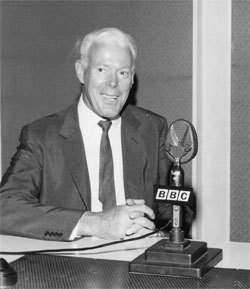Copyright 17 August 1987
Trevor Leggett was head of the Japanese Department of the BBC.

This is one of his broadcasts to Japan
Zubari for 17 August 1987
Hello listeners! Today, the theme is: journalists.
Have you ever known a journalist well? I do not mean a financial expert, or art expert, or legal or literary expert, who regularly writes for the Press on his subject. I am speaking about the ordinary journalist who writes a regular column about everyday life.
Well, if you have known such a man well, and you read his column, you may have noticed in him a little habit which many of them have. It is this: during the conversation with him and a few others – perhaps at lunch, you say something very amusing or clever. Then, next week, you read your words in his column; but your name is not mentioned. They appear simply as the clever, or amusing, thoughts of the journalist himself.
Your first feeling is irritation. You feel that, in a way, he has stolen your words, and is selling them to make money. But if you reflect a little, then you think: ‘No, he has not stolen anything, because I should never have made any money from them. I am not a journalist. And he has preserved the remark, which otherwise would have been lost, like a thrown-away newspaper.’
Thinking like this, one’s irritation vanishes. Or, it almost vanishes. I must admit that when I say something which makes the whole table laugh, and after about half a minute I see a journalist covertly scribbling something on his paper napkin and putting it away in his pocket, I still feel a flash or annoyance. I have just put some money in his pocket. And he did not say: “Thank you!”
As I am a writer myself, though, I have some sympathy with him. Perhaps he has to write an article for a deadline, and he has no ideas. My casual remark perhaps gave him a good one. I think back, and remember how sometimes I myself was helped by a remark which I heard by chance from someone else.
Of course, when I have published a book, the law of copyright enables me to sue him if he uses large sections of it. But the law does not protect small pieces of less than 500 words. The borrower must however mention the name of the original author.
A most infuriating experience of my words being borrowed came a couple of years ago, when a prominent American author used a passage of 500 words from a book of mine. I was describing a particular Kabuki performance. Now, an Englishman’s English, and an American’s English, are often somewhat different. His book won an important Literary Prize in America, and I was told that there was a page in it quoting from one of my books. So, I felt quite pleased. But when I found the page, I discovered that he had altered my English quite a bit, to make it much nearer to his own American style! Disgraceful!
I turned angrily to the Acknowledgements section at the end of the book, and I found there my name and the title of my book, with the note: ADAPTED. I was irritated: my beautiful English had been vulgarised into his crude American English!
I asked a legal expert, and he said: “Well, he ought to have asked your permission as a courtesy. But he was not bound to do so by law. You should, however, realise that he has given your book considerable publicity. Don’t you think that is more important than your momentary annoyance?”
When I thought about it a little, I realised that I agreed with him, and my annoyance vanished.
Well, listeners – please feel free to use any ideas from this little Zubari broadcast. You need not say where they come from, but please mention, in passing, our times and wavelengths!
© Trevor Leggett